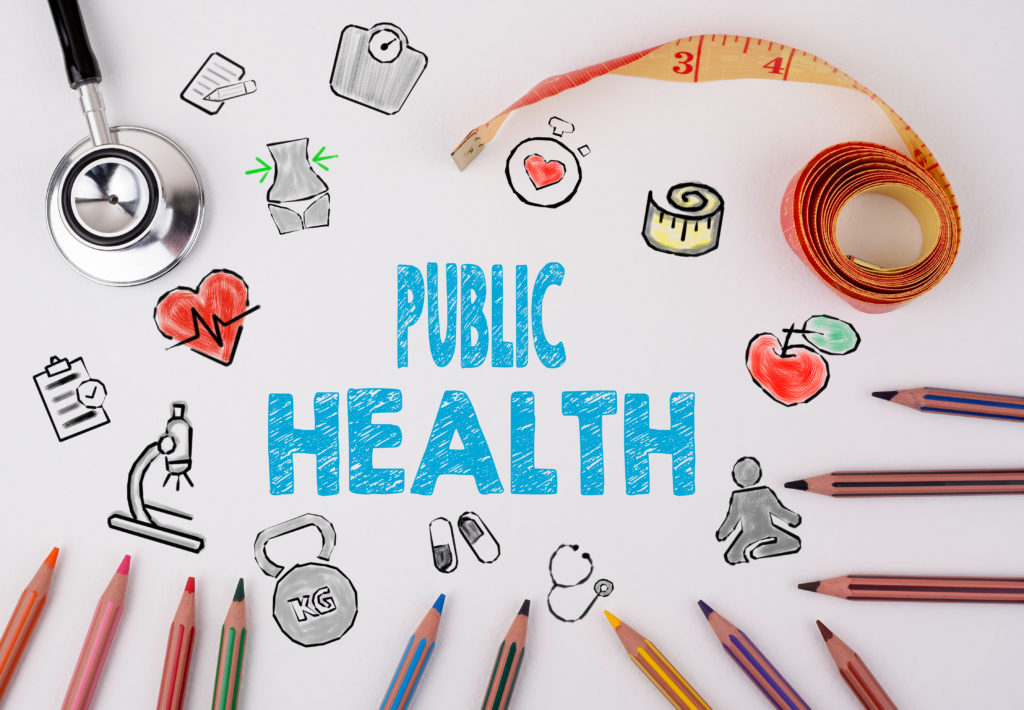
Healthcare is a rapidly growing and evolving field that requires an approach that is multidisciplinary in caring for individuals. It also involves finding long-term sustainable solutions in improving health within the population. Dual Medical Doctor and Master of Public Health (MD/MPH) degree programs are on the rise. Many doctors are opting toward dual degrees to work more effectively in the increasingly diverse business of healthcare.
A Doctor of Medicine and Master of Public Health degree program provides a solid core foundation in medicine and public health. It can equip professionals with the needed clinical and science skills to address health and wellness from both the perspective of the individual patient and the general population.
Featured Programs
Graduates with an MD/MPH can use these two perspectives in researching and identification of individual and public health issues. This helps them to design evidence-based approaches to health improvement. Students are prepared to work as physicians in the public health field and are also equipped to diagnose health problems and risk factors of individuals and communities.
See also: Why Should I Pursue a Career in Public Health?
What Is an MPH Degree?
MPH stands for Master of Public Health and is an interdisciplinary degree based in health sciences. MPH programs focus on health leadership, administration skills, implementing and managing public health programs, monitoring diseases, managing outbreaks, and more. If you want to become an MPH doctor, you’ll find that an MD/MPH program is a practical way to learn a variety of different skills. The training you will get through studying both programs will give you real-world experience that you can’t always gain through an MD program on its own.
What Are Some of the Advantages of the MD/MPH as a Dual Program?
- The time commitment required to earn both degrees is typically five years
- Students can eliminate duplication areas as opposed to taking each degree separately
- Integrated education and training in the combined MD and MPH degree programs complement and enhance each other to provide healthcare professionals with a much greater comprehension of health issues and better tools to understanding and preventing human diseases
- Students typically may take the MPH portion of the dual degree after their first or second year of medical school
Can I Specialize In an Area Of Public Health In a Dual MD/MPH Program?
Medical MPH programs allow students to choose a specialization or concentration in various MPH degree fields such as general public health, epidemiology, health policy, environmental health, and sociomedical sciences.

What Are Some of the Areas of Employment For Graduates of a Dual MD/MPH Program?
The dual MD/MPH program prepares students for careers in the following areas of employment:
• Public health agencies
• Community-based organizations
• Public and private healthcare organizations
• Health insurance companies
• Biostatistics
• Elite residency programs related to community and public health
• International health
• Research
What Can I Expect To Earn With an MD/MPH Degree?
An MD/MPH salary can be fairly high, and graduates of this dual degree are in constant demand. Because MD/MPH graduates can pursue a wide range of careers, salary ranges for MD/MPH careers can vary greatly. . There are dozens of specialties to choose from, but listed here are five of the most popular career paths.
MD/MPH Salaries and Career Paths
| Career | Average Annual Salary |
| Health Services Administrator | $100,980 |
| Epidemiologist | $70,990 |
| Public Health Educator | $46,910 |
| Clinical Researcher | $88,790 |
| Biostatistician | $88,790 |
Health Services Administrator
Health services administrators are also called health care administrators, health care managers, or health service managers. They are professionals who directly oversee the operations of health systems, hospitals, and similar organizations. They are responsible for staff, budgets, services, programs, and other leadership functions. They do not deal directly with patients. Instead, they help to shape public health policy and make improvements within the healthcare system.
Health Services Administrator Salary: $100,980
See also: What is the Difference Between a Master of Public Health and a Master of Health Administration?
Epidemiologist
Epidemiologists are public health professionals who study causes, locations, and outbreaks of diseases. They gather data related to how communities are affected by viruses, bacteria, and pathogens and work on solutions to prevent recurrences or stop infections from spreading. They typically work at government organizations like the (CDC) Centers for Disease Control, the (WHO) World Health Organization, and the (NIH) National Institute of Health. They also inform the public about how to protect themselves to improve overall health.
Epidemiologist Salary: $70,990
Public Health Educator
Public health educators are tasked with providing health, safety, and wellness information to the public. They inform communities about preventative actions and help to educate people on services and treatment available. They may develop specific outreach programs to target a particular group or conduct workshops and lectures to raise awareness about health issues. They may also create digital and print media circulated to the public and help answer general health questions.
Featured Programs
Public Health Educator Salary: $46,910
Clinical Researcher
Clinical researchers are professionals who ensure that research trials run smoothly and ethically while ensuring their team members comply with a set of strict guidelines and regulations. They must be able to handle documents securely and store materials safely. The responsibilities of a clinical researcher may be maintaining patient care during the trial, recruiting and screening potential participants, and submitting their findings once the trial is completed.
Clinical Researcher Salary: $88,790
Biostatistician
Biostatisticians are responsible for gathering data and analyzing statistics on living things. Specimens and samples are collected during research studies and are used to make predictions or draw conclusions. A biostatistician may also be part of the research study team in collaboration with other scientists. An essential part of this job is communication, as the role requires these professionals to write proposals and convey the results of clinical trials. Biostatisticians may also teach at specific schools while simultaneously conducting research.
Biostatistician Salary: $123,062
See also: Top 50 Masters in Public Health Online

How To Get Into an MD/MPH Program
There are a number of different actions involved in getting into a dual MD/MPH program; however, here are six tips to help you stand out from your peers:
1. Have a Firm Grasp On How Medicine and Public Health Are Intertwined
Imagine visiting a remote village where kids keep falling off a cliff into a deep ravine and drowning. The community is in despair that this keeps happening, and they don’t know what to do. Naturally, most people would dive into the ravine and try to save as many children as possible. But no matter how many kids are saved, the main issue of them falling off the cliff still remains.
This is where public health comes in. Yes, you want to rescue the children, but you want to figure out a way to prevent this tragedy from ever happening again. You resolve to look for ways to build a fence around the cliff. Perhaps you apply for grants or funding or recruit volunteers to help. To inform the public about keeping their children safe by not letting them climb the new fence, you hire a translator to convey the message in the native language. You may even establish a local school program to educate children about how dangerous it is to play near the ravine.
This story is the essence of how public health and medicine are interrelated. From a medical standpoint, aiding the children who are injured is paramount. From a public health position, preventing the issue from continuing is vital. If you are interested in both of these things, a combined MD/MPH program may be the right choice for you.
2. Enroll In Courses That Teach You the Principles of Public Health
While learning about public health is not the only way to integrate it into your medical career, taking public health courses is absolutely vital if you want to understand what is involved in keeping people healthy. Those who wish to gain admission into an MD/MPH program need to know the basic framework of public health and its many disciplines.
You don’t necessarily need to major in public health, but a minor is always a good idea. You should choose those courses that complement the field, such as biology, psychology, epidemiology, biostatistics, sociology, math, anthropology, etc. You must learn everything you can about how your field of study intersects with public health.
3. Get Involved In the Field Work
There are numerous ways to get involved in the many specialties within the public health sector. Most MD/MPH programs have specific capstone projects or fieldwork that are required to get your degree. Your goal should be to gain as much exposure to as many public health projects as possible.
There are plenty of ways to do this. Volunteering for community outreach events like health fairs, organizing new events for the future, and reaching out to local organizations should turn up plenty of ideas. Find programs that partner with community hospitals or organizations in your area and make a commitment to serve by putting forth your time and effort.
Try to consider the things that interest you and the skills you want to acquire. Then, start looking for ways to get involved in various health projects.
4. Make a Master List Of All the MD/Mph Programs You Want to Apply to
It’s essential to begin your research by looking for colleges and universities with combined MD/MPH programs. Most of these dual degree programs can be found on a school’s website. If you are already in medical school and want to be an MPH doctor, you can apply to an MPH program separately. Most medical students pursue a one-year additional degree program between their third and fourth years of school. Your masters can be in a wide range of fields, which is why so many students gravitate toward an MPH.
You’ll also want to find out if the school is affiliated with a specific public health organization. If it is, you can probably get involved in community or research products immediately.
It may also be possible to get your MD at a different institution than your MPH. This is especially true if another school can offer you more of a concentration in a specific area you want to hone in on.
See also: What is the Accreditation I Should Look For in a School of Public Health?
5. Show a Genuine Interest in Public Health In Your Essays and Interviews
So you’ve shown your interest in public health by getting involved in community projects and by taking courses in public health. Now it’s time to focus on creating your application essays, which should tell the story of the motivation you possess to study public health and medicine at the same time.
Schools like to see how you can integrate your experiences and motivation on paper and in an interview. Tell a personal story about how a project has made you realize the importance of public health education and how this relates to your career down the road. Be detailed and descriptive about the things you have done. Convey your excitement and enthusiasm about any projects that you’re particularly passionate about.
6. Ask the Right Questions
If you want to make the right decisions, you need to ask the right questions. Not everything can be answered on the Q&A page of a school’s website. You need to check in with faculty, doctor/MPH professionals, current and former students, and others about your various options for obtaining a dual degree.
Find out how many other students follow this same path and if there is any funding available for an MPH degree. Ask past students why they chose a specific institution to get their MPH and ask about any help the school offers in applying to a program. Find out if students who earned an MD/MPH degree feel that it helped them achieve their goals and prepare them adequately for clinical practice.
Closing Thoughts
It is increasingly evident that many of today’s health problems doctors deal with are related to social problems. For these issues to be adequately addressed, it is necessary to treat not just the symptoms of the problem but also the source of the problem. This is why more professionals interested in medicine also consider earning their Master’s degree in public health.
Take a look at these additional resources for information on dual degrees and Master’s in Public Health programs: